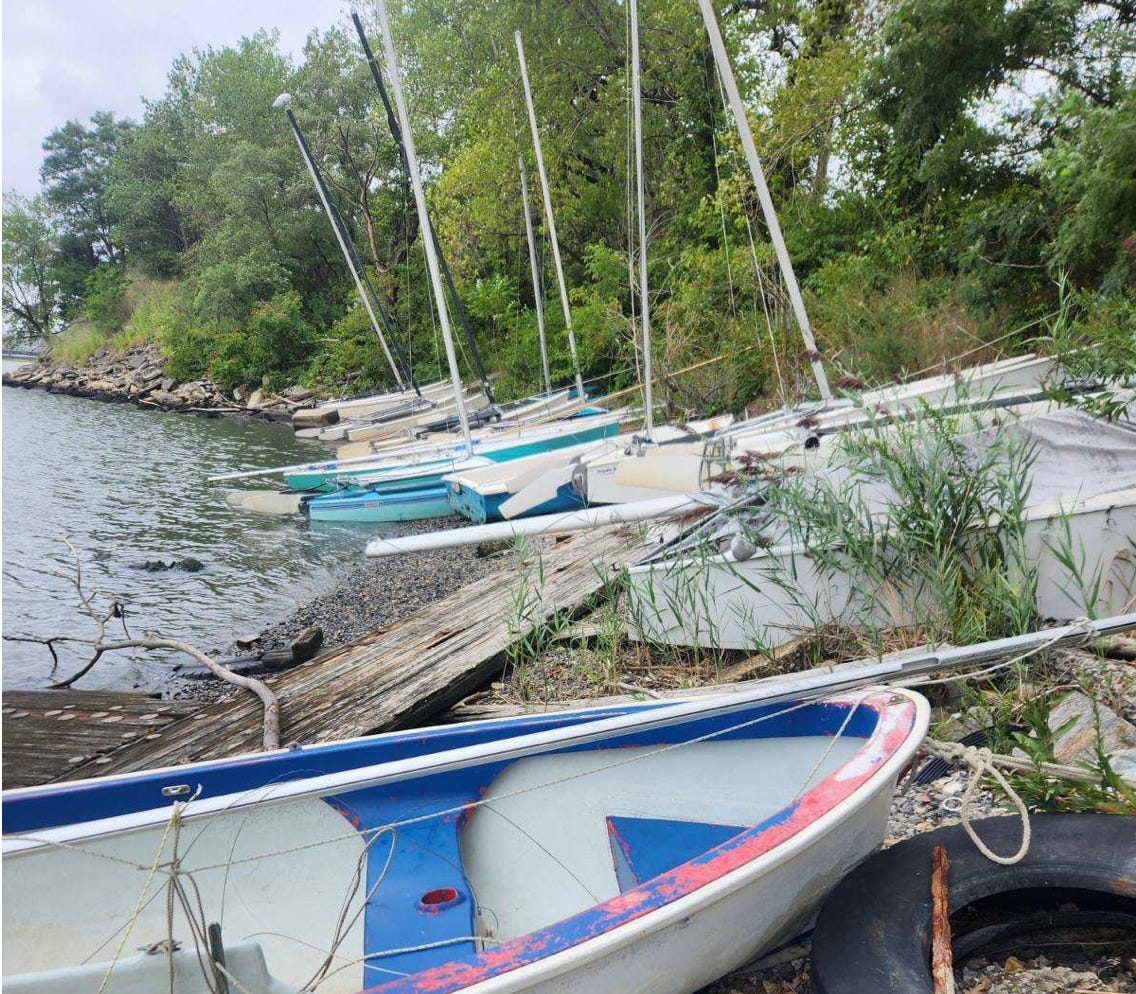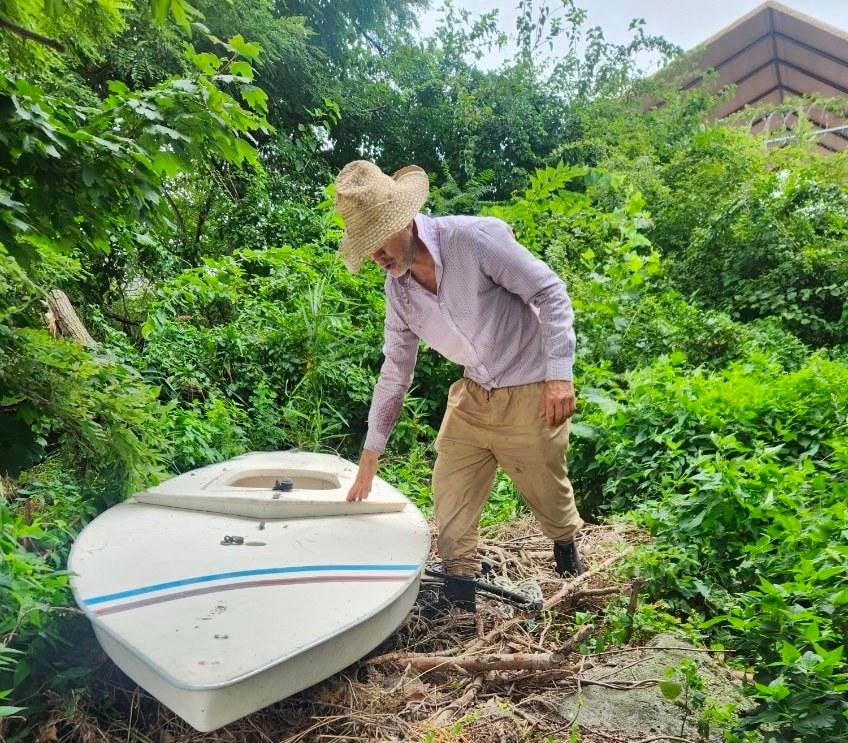New York City is surrounded by water.
Close your eyes and imagine the Hudson River, the East River, the Harlem River, Long Island Sound, Jamaica Bay, the New York Harbor and the Atlantic Ocean which laps against Coney Island and the Rockaways. Amid all the concrete and tall buildings and the daily grind of our lives, it’s easy to forget about the water, the smell of sea salt in the air and the cry of a lone gull soaring overhead and how freeing it all can be – especially when that connection is made outside the confines of capitalism.
“Sailing is truly freeing – moving fast, driven by nothing but the wind – the tethers of movement and space loosened from their normal binding to clock and wallet,” Moira Marquis writes. In the essay below, she describes a messianic sailor, a gritty, plastics-strewn beach along an obscure part of the East River in Queens and the ad-hoc marina and free sailing school he has created there.

Maybe it’s the approaching end of summer, but we’ve been on a bit of a nature kick on our weekly Tuesday radio show. Catch our recent interview with the NYC Bird Alliance about the Rockaway shorebirds who have been battling NYPD surveillance drones hovering over Rockaway Beach. This past Tuesday, we spoke with a pair of eco-socialists about the growing movement to transition New York’s energy system away from fossil fuels to wind and solar. Our next show will be this Tuesday 5-6 pm on 99.5 FM and streaming on wbai.org.
SUPPORT INDYPDENDENT JOURNALISM TODAY
New York’s Free Sailing School: Lessons in Avoiding Capitalism
By Moira Marquis
Slipping through the gap in the chain link fence, I am immediately confronted by a maze of boat trailers, masts, bows and hulls arranged haphazardly amidst the stand of adolescent trees of heaven. Littering the ground are life vests, crocs, a single flip-flop, a bag of charcoal spilling out onto the soil. I’m clearly in the right place: New York City’s only free sailing school.
Christian Patrick, the founder of the free sailing organization, rushes up with an enthusiastic “hi!” He dons a crumpled straw hat and has the messianic energy of a cult leader. At the orientation the evening prior in a swanky midtown building lobby complete with fake moss and fern walls, he’d told everyone he would teach them how to sail, but “the most valuable thing I’ll teach you is how to live outside of capitalism!” He paced and switched topics breathtakingly fast, but he had nearly everyone rapt.
That recent evening he told the gathered crowd of 20 or so people about Home Beach, where the sailing occurs and the boats are stored — an over three-acre lot he’s squatting in an industrial area of Queens, adjacent to LaGuardia Airport. Some people exchange worried glances. “Don’t worry,” he tells everyone, “That’s on me.” This land has been home to the sailing school for two years. One woman gets up and leaves.
A high level of commitment is necessary for participation in the free sailing school. First, you have to attend a Friday evening introduction lasting three hours where Captain Patrick introduces the basics of sailing. On Saturday you have to contribute six hours of labor on Home Beach and finally, on Sunday, you get your free sailing lessons. Once you’ve completed this three-day introduction, you can come and sail — for free! — any weekend throughout the entire year, even in the winter.
It’s taken me a while to be able to commit to this schedule. I first saw Captain Patrick talk outside La Plaza community garden, just down the block from Tompkins Square Park, over a year prior. He had hauled a boat on a trailer all the way into lower Manhattan and was talking to a crowd of around 30 people that had gathered to hear about free sailing. People revealed a wide variety of reasons for being there. One couple said it was in their emergency plan and detailed their go-bag scenario; a young man said he’d always had a fascination with sailing and talked about wanting to circumnavigate the earth on a boat. I stumbled on this meeting by accident and had a more modest goal: I had enjoyed sailing as a kid and wanted to do it again.
Home Beach is a wooded lot edging a bay off the East River. I’m the first to arrive despite being 20 minutes late. It is a pain to get there — a long walk from the nearest train line and a treacherous bike ride towards the end where you cycle through pothole ridden, treeless streets edged by factories without even clearly demarcated car, let alone bike, lanes. Captain Patrick puts me to work picking up discarded plastic bottles and coiling rope.
Other people begin to arrive, and we’re given a tour. There’s a boat ramp, (two-by-fours edging sandbags filled with debris), a storage locker (a metal motorboat strapped to a tree) and lots of boats waiting to be repaired. Captain Patrick asks if anyone knows how to weld. Cars zoom along the expressway in the background, and every couple of minutes an airplane stops the conversation with its deafening engine roar.
The lot is full of mugwort and sweet-smelling honeysuckle covered by the shade of prolific trees of heaven. We clear a path by stomping on the tall weeds. Further ahead, a small beach is littered in plastic.
“We had this all cleaned up,” Captain Patrick apologizes. “Each time the tide comes in it carries more. There are millions of tiny pieces of plastic,” he sighs. “If anyone wants to clean this up, that’d be great. At least to make a start…” People immediately bend down and start picking up bottle caps and some larger pieces, putting them in their trash bags. “Come on,” Captain Patrick gestures, “We can come back. Let’s look at the boats.”
The beach has about 20 working boats all lined up in a row. Most are catamarans. The view of all the boats on the water energizes the group, and after this final stop we begin our six hours of labor. I’m put to work assembling a Sunfish that Captain Patrick has acquired, like the rest of the boats, for free. It’s an older boat with a wooden tiller and copper fittings. I haven’t rigged a boat in 30 years, and it takes me, and the poor other people who volunteered to help me, quite a long time to get it together. Captain Patrick troubleshoots when we hit a wall, but mostly he’s off busily managing the day’s myriad activities.
After way too long, the boat is rigged and Captain Patrick invites us to sail. I am thrilled — I thought I’d have to wait until Sunday, but his enthusiasm for being on the water overrides his labor plans, and soon I’m gliding over waves with the wind in my hair. I don’t even hear the planes or the car traffic.
Sailing is truly freeing — moving fast, driven by nothing but the wind — the tethers of movement and space loosened from their normal binding to clock and wallet. He isn’t wrong. In this place, so wrecked by the ravages of everything-only-for-profit, the Free Sailing School truly does offer another vision of what we could be doing. Captain Patrick’s goal is nothing less: “I want to change the world,” he says.
You can find out more about the Free Sailing School at freesailingschool.org.
The Indypendent is a New York City-based newspaper, website and weekly radio show. All of our work is made possible by readers like you. Please consider making a recurring or one-time donation today or subscribe to our monthly print edition and get every copy sent straight to your home.



